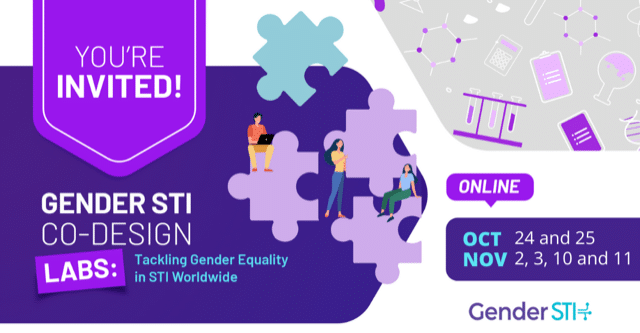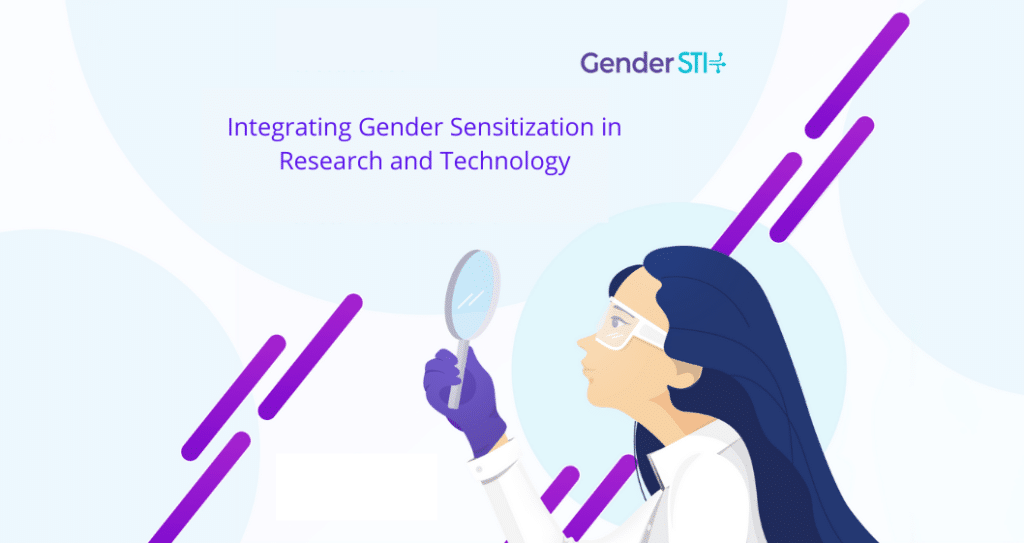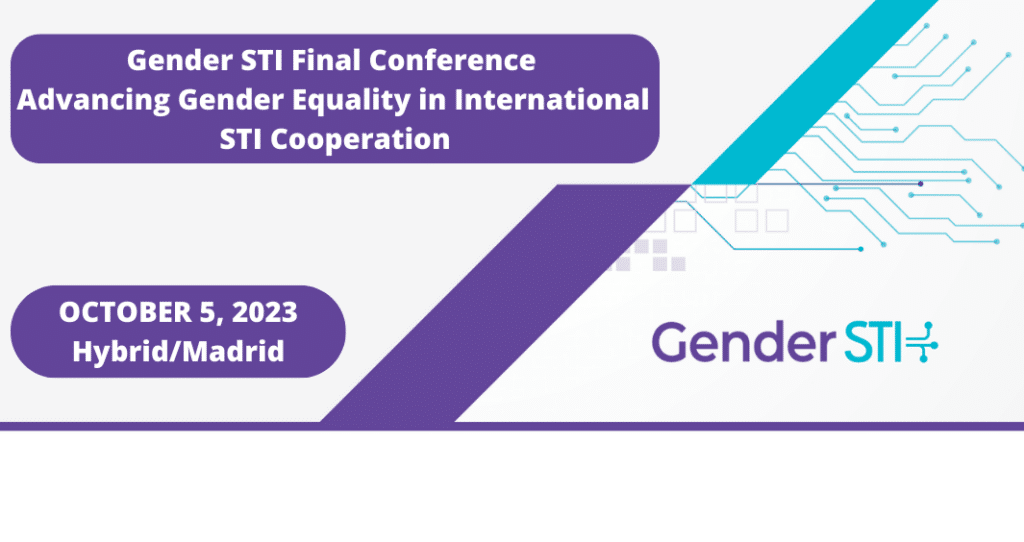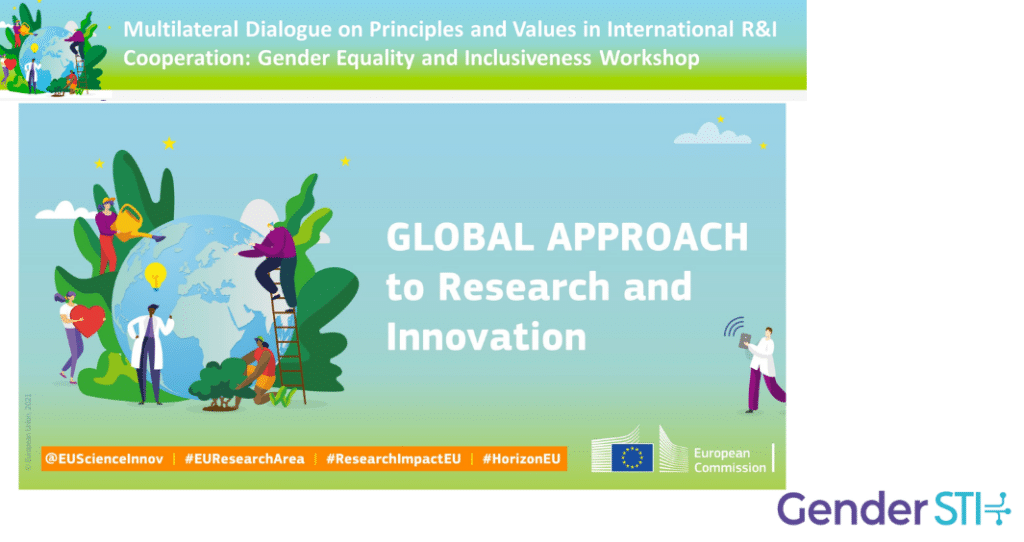Agenda
Gender STI Co-design LAB2: sessions for participants from America and Europe
Session 1: Monday 24th of October from 14:30 to 17:30 CET
Session 2: Wednesday 2nd of November from 14:30 to 17:30 CET
Session 3: Thursday 10th of November from 14:30 to 17:30 CET
The Co-Design Labs
Gender STI’s Co-Design Labs, which will include participants from 16 countries across four continents, focus on three of the forefront challenges facing women in science, technology and innovation (STI): gender equality in scientific careers, gender balance in decision-making bodies and positions and the integration of the gender dimension in research and innovation content.
The Lab sessions aim to identify the key issues in these areas and develop potential solutions using design thinking and online facilitated processes. Participants will discuss opportunities in their country or institution; and co-design potential solutions that can be implemented to foment greater equality in these areas in the weeks, months and years ahead.
Input from participants will contribute to a roadmap with recommendations that will be presented to the European Commission and shared with other decision makers from different countries interested in gender equality. All participants will be included as contributors to this roadmap, which will also be featured in the project’s European Observatory on Gender in STI.
Challenges to be Addressed
Challenge 1 – Gender equality in scientific careers at all levels: The challenge is to attract more women to the STI field. Gender equality is always in focus, but by creating an inclusive and diverse work environment, it is also possible to promote women who experience more than one discrimination. However, it is not about changing women but rather about creating an environment in which everyone has the opportunity to contribute. It is time to do diverse research, to create technology for all to get the best results.
Theme: Gaining women in STI.
Main Questions:
- What needs to be done to ensure that young women choose STI as a career path by creating a diverse and inclusive work environment?
- What funding mechanisms support a diverse and inclusive research field to attract more women in the field of STI?
- What policy actions can be established to attract young women in STI?
Challenge 2 – Gender balance in decision-making bodies and positions: Few women are in leadership positions or involved in decision-making. In academic events and conferences, for example, women are significantly underrepresented compared to men as keynote or plenary speakers or as panellists. The source of this phenomenon is widespread and often unintended gender bias. In this regard, success stories from women can help to raise awareness and to amplify women’s voices and role in the STI field. The low number of women in decision-making positions throughout the science and technology system is a waste of talent and capacity that countries’ economies cannot afford.
Theme: Inspiring women in STI.
Main Questions:
- How can the vision of gender be incorporated into the definition of STI conference programs?
- What can be done to promote inclusive leadership skills and women success stories in STI events?
- What can institutions do to guarantee a space for young women to be mentored and learn collaboratively?
Challenge 3 – Integration of the gender dimension in research and innovation content: One of key challenges of integrating the gender dimension in research and innovation (R&I) content is the lack of capabilities for taking on gender analysis and assessment. Moreover, gender understood from the intersectional perspective encourages researchers to think beyond binary gender positions and integrate inclusiveness as the guiding principle for enhancing gender dimension in R&I content. The ways in which R&I content is created also influences whether R&I is reflective of the gender dimension.
Theme: Enhancing capabilities for inclusive knowledge production.
Main questions:
- What can be done to enhance gender sensitization in research and innovation funding organizations in implementation and reviewing of research calls and funding programmes?
- How can research institutions and researchers be assisted to take on inclusive research design and inclusive knowledge production?
- What indicators need to be developed to reflect inclusive knowledge production?
Schedule of Session 1 – Monday 24th of October from 14:30 to 17:30 CET
Main Goal: Opening, meet and greet. Join the challenge group. Explore the challenges.
- Plenary introduction. Organizers will describe the Gender STI challenges and introduce the lab method and schedule.
- Meeting the groups. The participants break out into three challenge groups.
- Exploring challenges and opportunities. Deepen understanding and reframing the challenges.
- Plenary closing and next steps. Talk about what’s expected in lab 2 on the next day.
- Asynchronous assignment: Explore the opportunities and generate the first ideas (over 1 week).
Schedule of Session 2 – Wednesday 2nd of November from 14:30 to 17:30 CET
Main goal: Deepen understanding on ideas and opportunities. Build initial prototypes. Revisit opportunities.
- Plenary opening and check-in. Introduce the aim of the day’s session and schedule.
- Focused reflection. Feedback on the opportunities and new ideas.
- Build initial prototypes. Converge ideas to create initial prototypes emerging from the reflection on the challenges, ideas and opportunities.
- Feed forward instructions to work asynchronously in Basecamp and collaborative tools. Roadmapping the next 6 weeks, 6 months and 6 years.
- Plenary wrap-up of lab 2. Introduction to the next steps.
- Asynchronous assignment: Prototype improvement, building and testing. Thinking forward (over 1 week).
Schedule of Session 3 – Thursday 10th of November from 14:30 to 17:30 CET
Main goal: Roadmap finalization and presentation of proposals
- Plenary opening and check-in. Introduce the aim of the day’s session and schedule.
- Alignment in groups to fine tune the presentations of the proposals. Groups that have worked asynchronously share briefly their findings and decide how to present them.
- Plenary presentation of the proposals in a roadmap. Proposals of prototypes are presented indicating a roadmap of activities.
- Challenge groups reflect and renew on what we have learned. Participants reflect on the prototypes and on the lessons learned.
- Plenary launch of the GO, NO-GO prototyping phase. Discuss the asynchronous prototype implementation.
– Concluding plenary. The ways forward to prototyping on location.



